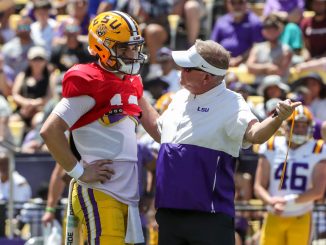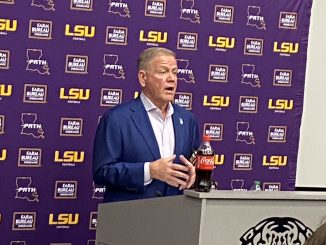
LSU’s Title IX problems, including a string of domestic violence and sexual assaults by Tigers’ football players that seemingly went unchecked as well as allegations against former football coach Les Miles, was mostly the fault of the school’s lack of defined policies, resources and personnel.
Scott Schneider of Austin, Texas based-law firm Husch Blackwell hired by LSU in December to investigate the problems revealed in a November USA Today investigative report, publicly presented his determinations in a 148-page report via an hour-long Zoom teleconference Friday at the LSU Board of Supervisors meeting.
What Schneider and his team found through 25 focus group sessions and 50 interviews of current and former LSU employees, students, witnesses and other university stakeholders was the school was ill-equipped to process Title IX cases because past fixes to the process were ignored too long by university leadership.
“I don’t think the university was in a position for a variety of reasons to handle cases that are exceptionally complicated and require an institution to be firing on all cylinders in their Title IX program,” Schneider said.
Thomas Galligan, LSU’s interim president since Jan. 1 after F. King Alexander left to become Oregon State’s president, inherited the mess that Alexander as well as retired athletic director Joe Alleva left behind when he was forced into retirement almost two years ago.
“I recognize institutional policies have not been clear,” Galligan said. “Employees have been overburdened through lack of appropriate resources. People have generally tried their best under exceptionally difficult circumstances.
“But the fact remains that we, as an institution, failed to live up to our commitments. We let some of those who were depending on us down. It’s clear our institution as a whole deserves blame.
“This is an example of serious institutional failure.”
As a result, Galligan disciplined executive deputy athletic director Verge Ausberry and senior associate athletic director Miriam Segar.
Ausberry, who failed to report an assault committed by former LSU wide receiver Drake Davis to either Segar or the LSU Title IX office, received a 30-day suspension without pay during which time he will undergo required domestic and sexual violence training.
Segar, as the athletic department’s point person for Title IX who repeatedly was in the middle of sticky case after sticky case, was given a 20-day suspension without pay. She will also take mandatory domestic and sexual violence training.
“I have great confidence in Miriam and Verge that they will move forward, they’ve accepted it and they will understand how we do it,” LSU athletic director Scott Woodward said. “They are wonderful employees who have not only helped dozens and dozens of student-athletes, but also general students. They are good people and put in untenable situations.”
Galligan said there may be more discipline given to the others after he reviews the report again.
LSU Board of Supervisors chairman Robert Dampf acknowledged Galligan’s disciplinary decision involving Ausberry and Segar would be viewed differently in various quarters.
“There will be students and members of the community and media members who don’t feel like it (the punishment) was appropriate,” Dampf said. “There may be folks thinking it was too harsh.
“It’s all over this report we clearly have a failure of leadership and resources. That almost mandates failure and we failed.”
Before Schneider talked with Galligan and answered questions from the Board, the Board was verbally reprimanded via Zoom by May 2020 LSU graduate Caroline Schroder, who was one of the sexual assault victims in the report.
On October 28, 2016, LSU students Schroeder and Elisabeth Andries (who didn’t know each other at the time) were invited to an LSU fraternity party in New Orleans with transportation to and from the event being provided by the fraternity.
On the ride back to Baton Rouge, they were both sexually assaulted by the same fraternity member. Both women filed charges and the case was poorly handled and investigated at a snail’s pace by the LSU Title IX office.
The fraternity member was eventually given lightweight sanctions involving being required to take a “Commitment to Community” course and undergo an anger management assessment by the school student health center.
“Today, you are not here out of the goodness of your heart,” Schroeder told the Board. “We’re here because a national newspaper published a story in November off last year which created a bit of a public relations problem for you. It’s the only reason you are here now contending to resolve this issue.
“I’m here to remind you of whatever you hear today, you are ultimately responsible for this mess. Whether it’s because you don’t care or you’re just bad at doing your job, you are the guilty party here.”
Most of the problems involving reporting domestic violence and sexual assaults allegedly committed by LSU football players centered on then-athletic director Alleva’s instance of ignoring school policy that required such allegations be reported directly to the school’s Title IX office.
Instead, beginning in 2013, Alleva issued a series of departmental policies that stated athletic department employees aware of a student-athlete being arrested, engaging in misconduct unbecoming of a student-athlete or involved in recruiting violations and participates in hazing activity most notify Miriam Segar no later than 24 hours after the incident.
“The edict for Miriam in essence to be a checkpoint for whether the report gets to the Title IX office was his,” Schneider said of Alleva. “You can’t allow athletics to decide what goes to the Title IX office. It needs to go to the Title IX office. I don’t want to overstate the significance, but I don’t want to understate it.”
Schenider did give Alleva and not the university credit for the way he reacted in 2013 to a report on Miles by Taylor Porter, the university’s outside law firm. Miles was accused of texting female students, kissing a student and suggesting they go to a hotel after telling her he could help her career and taking female students to his condo alone and making them feel uncomfortable.
The 34-page report was finally released this week after Miles and LSU had blocked it since its release eight years ago. Peter Ginsberg, Miles’ attorney, said Miles is still denying the allegation and allowed for the release of the report to end the “baseless, inaccurate media reports.”
Miles was placed on administrative leave from his coaching job at the University of Kansas on Friday evening. Kansas athletic director Jeff Long announced in a statement Friday evening. Long said that Kansas will “conduct a full review to determine the appropriate next steps.”
Alleva took the allegations seriously after they happened. He met with Miles and barred him from having any one-on-one meetings or interactions with student employees, and from texting or calling them. But as his behavior allegedly continued as documented by the Taylor Porter report, Alleva sent e-mails to LSU Chancellor William Jenkins and counsel on April 19, 2013 and to school president Alexander and counsel on June 21, 2013 recommending Miles should be fired for cause.
“I specifically told him not to text, call or be alone with any student workers and he obviously didn’t listen,” Alleva said of Miles in his E-mail to Alexander. “I believe there are many possible outcomes and much risk either way, but I believe it is in the best interest in the long run to make a break.”
When the Taylor Porter report concluded Miles didn’t have sexual relationships with any of the women but found his behavior inappropriate, the school allowed Miles to continue coaching until he was fired after the fourth game of the 2016 season.
Schneider said he second-guesses the way the university dealt with Miles.
“I continue to question if the Les Miles situation had been handled a little differently, the impact that would have had on the (future) culture of the athletics program in terms of what we tolerate and that reporting is valued,” Schneider said.
Such as the case with star running back Derrius Guice. It has been previously reported that Guice allegedly sexually assaulted an LSU swimmer in January 26, 2016, allegedly forced a drunk LSU tennis player to perform oral and then vaginal sex in June 2016 and then in July 2016 snapped a nude picture of a football operations student worker without her consent.
A new allegation revealed Friday in the Husch Blackwell report was Guice “aggressively sexually harassed” a 70-year old Superdome security guard on Dec. 9, 2017 when Guice was attending a state high school championship football game involving his alma mater Catholic High.
The guard filed an incident report with the LSU Student Advocacy and Accountability office. In the report, she said she was sitting at her post when Guice and several men approached her. She said Guice told her he “likes older women” and asked if she would have sex with him. She said she was shocked and that it was not funny, but Guice continued to point at his crotch and grab himself in front of her saying “older women are my thing” and they could just “go off and do it somewhere.”
The guard reported the incident to her supervisor and that person called the Coach at LSU (which Husch Blackwell was not able to identify). The coach said that Guice was probably just kidding around and that he came from a broken home. She said she did not care and Guice should be punished for his behavior because she said he did it with such ease that she felt like he had done this before.
The coach asked if she wanted an apology and she said she wanted Derrius to sit out LSU’s upcoming Citrus Bowl game. The coach dismissed her and no one ever returned her calls.
LSU head coach Ed Orgeron told Husch Blackwell he never had any direct communication with the alleged victim stating “Segar told us about the incident”. Orgeron also said Segar, Ausberry and a Taylor Porter attorney did an investigation and he was “not sure what happened.”
Segar never reported the incident to the LSU Title IX office though the school’s Title IX policy applied to “off campus” conduct in certain situations.
By the time Guice played his final game on January 1, 2018 in the Citrus Bowl, he was never put through the school’s disciplinary process for his four reports of sexual misconduct in the previous year. The Husch Blackwell report also said there are no records if Guice was ever notified of these reports or that LSU even intervened to provide him some targeted training.
Also in its report, Husch Blackwell made 18 recommendations on how LSU can fix its broken, inadequate system of reporting and processing Title IX cases.
It includes everything from hiring more Title IX office staff to implementing internal monitoring and annual reporting to making mandatory reporting obligations clear.
Galligan announced Friday the university has formed a new office of Civil Rights and Title IX.
“It’s a centralized, visible on-campus office that will house Title IX as well as Title VII, ADA, accessibility and other related functions,” Galligan said. “Jane Cassidy, the senior vice-provost for academic affairs, has agreed to lead this office on an interim basis as we build the infrastructure, launch new programs and undertake a national search for a permanent leader.
“We will be hiring several new staff, including a case manager, administrative support and additional investigators. We will also designate a deputy Title IX coordinator for support resources.”
Galligan is also stressing public, transparent accountability as the process moves forward.
“We have to take the 18 recommendations Husch Blackwell has made and other things we are doing and we have to put them on a public checklist,” Galligan said. “We’ve got to say, `Here’s what we’re going to do, here’s when we’re going to do it by.’ We’ve got to be more transparent than we’ve ever been before.
“Each and every one of us is subject to the same rules, the same reporting requirements and the same standards of behavior.
“But the most important thing – and this going to take time – is culture. The culture has to be we do not accept domestic and sexual violence at LSU. That is not who we are. I love this institution and I love it mostly because of its people. We failed our people in this regard, so we have got to change the culture.”




Perhaps there should be some turnover of the Board of Supervisors, too.